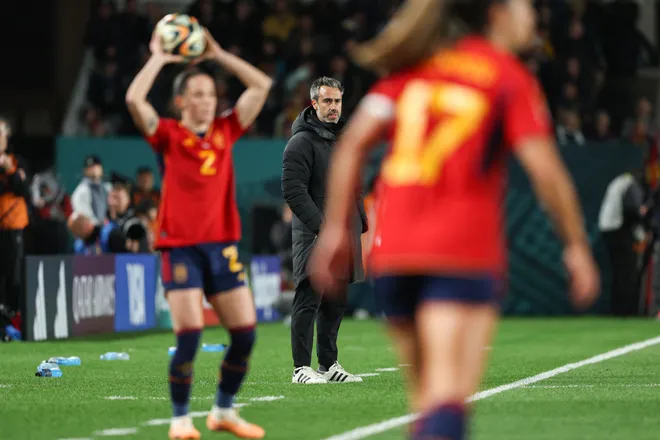Spain's World Cup final run a blessing and curse. Federation unworthy of team's brilliance
There is something perverse, and infuriating, about Spain reaching the final at a World Cup that has been a non-stop advertisement for the growth of the women’s game and the heights it can reach when you respect those who play it.
Perverse because Spain has not done this. Gone out of its way not to, in fact. Infuriating because its federation and coach, Jorge Vilda, don't deserve to reap the benefits of the brilliant players for whom they’ve shown so little regard, both those at the World Cup and the others shunned back home.
“Once again, I value my players a lot,” Vilda, speaking through a translator, said when asked after Spain’s 2-1 victory over Sweden on Tuesday about the turmoil that’s surrounded his team for the past year.
“(The) result is a learning process, which has made us all stronger, in my opinion.”
Oh, really. There are at least a dozen women I’d be willing to bet would disagree. Women who helped Spain’s team get to the elevated state it now occupies, only to be kicked to the curb by Vilda and the federation because they dared ask to be treated as humans rather than cogs in a machine.
WORLD CUP CENTRAL: 2023 Women's World Cup Live Scores, Schedules, Standings, Bracket and More

This is to take nothing away from the Spanish players, who have been tremendous and are every bit deserving of their place in Sunday’s final.
They play with a fluidity that is breathtaking to watch, connecting passes as if the ball is on a string. Salma Paralluelo, who scored Spain’s first goal Tuesday, is mesmerizing, gliding across the field until she unleashes a thunderbolt from her foot. Aitana Bonmati is as ruthless as advertised.
In short, they exemplify the beauty in the beautiful game.
But Spain is succeeding in spite of Vilda and the federation, who are a constant reminder that, for as much progress as the women’s game has made, there is still so far to go.
For those who have forgotten, as I’m sure Vilda and his bosses would prefer, 15 of Spain’s top players sent a letter to the federation last fall, saying they didn’t want to be called up for the national team until their complaints about the training environment were addressed. Treatment of injuries and support services — or a lack thereof — were concerns, as was Vilda's heavy-handed way of dealing with his players, on and off the field.
It was clear the players didn’t trust Vilda and chafed at his management style, but they insisted they weren’t asking for him to be fired. Nor had they wanted the letter to become public, hoping instead their concerns would be addressed privately.
But the federation and Vilda went scorched earth. The federation scolded the players as if they were children, saying they needed to “accept their mistake and ask for forgiveness.” Vilda called the situation “a farce” and dropped the players, turning to Spain’s long list of up-and-comers.
Spain continued winning and the federation continued backing Vilda, which has only emboldened him further. In a next-level show of pettiness after some of the players asked earlier this year to return, he passed over Barcelona goalkeeper Sandra Panos, a two-time Champions League winner, in favor of her backup, Catalina Coll.
Of the 23 players on Spain’s World Cup roster, only three were among the 15 who protested their treatment. Two-time Ballon d’Or winner Alexia Putellas and all-time leading scorer Jenni Hermosa, who publicly supported the 15 but didn’t sign the letter, are also at the World Cup.
“Leave it archived in the past, to think about the future and to think that we’re here because we deserve it. Not (because of) what we’ve been through, but (because of) the work of many, many people,” Vilda said.
“We’ve been capable to employ all our energy in what’s positive and what’s important, to be at this stage.”
Spain is hardly the first team to have to overcome disrespect, sub-par conditions and even abuse from coaches and team officials. The history of the women’s game is defined by persistence and courage, progress coming despite what players don’t have rather than because of what they do.
But this World Cup, with its expanded field of 32 teams and cornucopia of upsets and electric finishes, has shown what’s possible when the women’s game is taken seriously. When countries provide their women’s programs with support and resources rather than lip service.
Spain should be a shining example of this. After decades of the big clubs treating their women’s programs as afterthoughts, at best, Barcelona has put truckloads of money into its team. Its development system is now second-to-none, and it spares no expense in providing its teams at every level with the resources — coaching, nutrition, training, physical therapy — needed to succeed.
The result? Barcelona now has a stranglehold on Liga F, winning the last four titles, and its Champions League title this year was its second in three seasons.
And Spain has been the beneficiary, with Barcelona now a pipeline for the national teams. All but four of Spain’s starters Tuesday play for Barcelona, as do two other players. Five of the starters on Spain’s team that won the U-20 World Cup last year are with Barcelona. So were three of the starters on the U-17 World Cup champion team.
Other clubs are following suit. Players from Real Sociedad, Athletic Bilbao and Real Madrid now feature heavily on Spain’s youth national teams.
The club-country partnership should make Spain a model for the rest of the world. Instead, Instead, Vilda and Spain are making it difficult to celebrate that progress when they shirk their commitment to respecting and championing their players – threatening to squander Spain's potential as a world powerhouse for years to come.
It’s remarkable Spain is playing for the title in only its third World Cup appearance, and its players should be applauded for it. But do not forget the ugliness that's not far beneath, and do not let Vilda and the federation celebrate an achievement they did everything in their power to sabotage.
Follow USA TODAY Sports columnist Nancy Armour on social media @nrarmour.

Disclaimer: The copyright of this article belongs to the original author. Reposting this article is solely for the purpose of information dissemination and does not constitute any investment advice. If there is any infringement, please contact us immediately. We will make corrections or deletions as necessary. Thank you.







